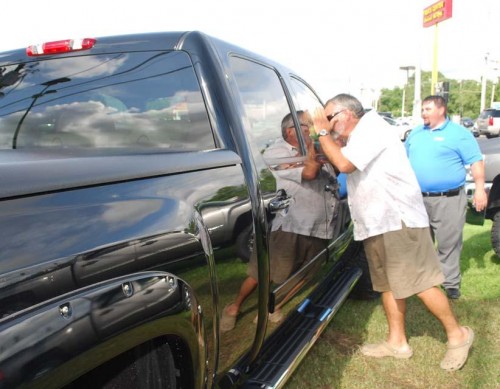Emile Joseph Bourgeois Sr.
May 25, 2009
Madeline Marie Cadiere Usie
May 29, 2009The troubles afflicting the Big Three automakers in the U.S. are bound to affect car dealers in the Tri-parishes, even though no local outlets are slated to close and the area economy is still relatively strong, several local car dealers said.
Nationwide, General Motors will eliminate around 1,100, or 18 percent, of its 6,200 dealerships by late next year. Another 500 to 1500 could follow. The company is also trying to sell its Saab, Hummer, and Saturn divisions, sending out notices to 470 of the dealers about the status of those brands.
Chrysler gave notice two weeks ago to 789, or one-quarter, of its 3,188 dealers that their contracts run out on June 9. Company executives have said the move maintains the better-selling franchises and eliminates weaker-performing ones.
The dealerships that were cut represent 14 percent of Chrysler’s sales while General Motors’ cuts account for 7 percent of sales.
The nearest dealers to the Tri-parishes to shut down will be a Chrysler franchise in Hahnville and one in New Orleans, though the Geri LeBlanc dealership in Schriever stopped selling Buick, Pontiac, and GMC models in December.
In addition, Barbera Chevrolet-Chrysler in Napoleonville will discontinue offering Chrysler products on June 9, but will still sell Chevrolet products, said the dealership’s Bobby Barbera. Jackie Edgar Auto Super Store in Franklin no longer offers Chrysler, but still sells GMC, Mazda, Pontiac and used cars.
Chrysler, already in bankruptcy, has received $4 billion in aid from the federal government and will merge with Italian carmaker Fiat SpA.
General Motors has received $15.4 billion in federal government aid and may declare bankruptcy next week. The federal government could end up owning half of General Motors with the rest controlled by bondholders, shareholders and the United Auto Workers union.
Ford has taken no bailout money.
Dealers said sales are down significantly for all automakers, not just domestic producers.
To help give added strength to auto sales, the Obama administration announced in March that the federal government is backing all new car warranties, but what effect the massive infusion of aid will have is unknown.
Heinke Trapp, owner of Trapp Cadillac Chevrolet in Houma – the second largest car dealership in the Tri-parishes – is confident despite the publicity.
“The (national) news is all negative, nothing positive,” Trapp said. “Will GM be around to pay warranties? GM is not going anywhere. We need a plan and make it known so people will know what to do. It will instill confidence.”
Like most GM dealerships, sales at Trapp have been down for all types of vehicles – SUVs, trucks, and smaller cars. So when General Motors sent out letters two weeks ago via FedEx to the dealers the company would be eliminating, Trapp was slightly uneasy. There was nothing to worry about, however.
“I had a good feeling we were safe, but it was still unknown,” he said.
Most of the dealers that were closed were smaller ones selling fewer than 35 cars a year, Trapp said. His dealership sold nearly 95 a month in 2008.
And though eliminating the little guys makes sense, Trapp said the ways of General Motors are still something of a mystery to him notwithstanding his 20 years at the dealership.
“It’s hard to figure out GM,” he said. “Little dealers cost money, but the real reason is political, to reduce the body of dealers.”
He said the effect of the federal government controlling half of General Motors is also unknown.
“We get as much information about GM as the general public, what you can get off the Internet,” Trapp said.
One certainty is that if General Motors declares bankruptcy, changes will come to the dealership.
“Bankruptcy still has a nasty connotation,” he said. “I don’t like hearing about bankruptcy and GM.”
“We’re up in the air,” he said. “It’s a waiting game, a guessing game.”
If bankruptcy is declared, questions from customers about warranties will rise, Trapp said. Some customers inquire about warranties now. However, the fact that dealers in Terrebonne have been around a long time helps buttress confidence. Trapp was founded in 1930.
“But there are always questions,” Trapp said. “You can’t blame them. Buying a car is expensive.”
Trapp said General Motors would be in better shape if the company listened more closely to its dealers.
Ford, for its part, is happy not to have received federal bailout money, said Bob Barker, sales manager with Lafourche Motor Co. in Lockport.
“People on the street say they’re proud of Ford,” Barker said.
The company is in the best shape of the Big Three because of foresight, plus some luck, Barker said.
Ford mortgaged huge portions of its assets to gain credit in the market before the credit crunch occurred, he said. Ford believed it would gain $16 to $18 billion on the credit market but received $24 billion.
“That showed the faith they have in Ford,” Barker said.
The company expected to be profitable again in 2009, but profitability will more than likely have to wait until 2010.
Barker said Ford wants General Motors to stay alive because the loss of the giant (GM held 22 percent of the market last year nationally) could hurt the entire industry.
GM, Ford, and Chrysler combined held 48 percent of the market last year nationwide. In the 1980s, the Big Three held more than three-quarters of the market.
“Ford does not want GM to go bye-bye,” Barker said.
He could get his wish.
“The federal government bailout is everything GM could ask for,” he said.
General Motors can eliminate dealers, cancel labor agreements, and remove poison assets like Saab and Hummer.
“They can take it out of ‘bad’GM and put it in Cadillac and Chevrolet, the ‘good’ GM,” Barker said. “With the bad dealers gone, that’s a tremendous benefit for GM.”
Ford has acted to cut costs and reduce expenses on its own, but Barker feels the federal government still could help the company.
The government could extend aid to its financing arm, Ford Motor Credit, and expend funds to research the development of more fuel-efficient cars, a move that would help all domestic automakers.
Banks were aided during this recession and customers are paying high interest rates on car loans, Barker said.
“The government has done a lot to help Chrysler and GM survive,” he said. “If it truly wants to help, it can lend on the financing end.”
Te-Cye Adams, general manager of Barker Buick Pontiac GMC in Houma – the area’s sixth largest dealer – agreed that financing car buying has been a problem.
“People are more concerned with interest rates,” Adams said. “Credit is more a hindrance (to buying) than whether we go bankrupt.”
“People understand what’s going on,” he said.
Customers with middle range credit scores are having more trouble obtaining car loans, though local banks have stepped up efforts, Adams said. Sales so far this year have improved at Barker, helped along possibly by the new GM Total Confidence program, which includes payment protection if a customer loses his or her job.
Barker and Adams both said their companies will emerge out of this recession stronger and leaner.
Chrysler, under federal bankruptcy law, can cancel contracts without having to pay dealers or repurchase their vehicles, according to an MSN Web site. Dealers normally borrow money to pay for the cars on their lots then pay the companies back with money from the car sales, according to the Web site.
Chrysler’s local dealers were unable to talk about the company financially.
Veteran car dealer Sam Degeneres with Dick Barker Lincoln/ Mercury-Mazda in Houma had kind words for competitors Chrysler and General Motors, but Degeneres said he is proud to say he is a Ford man.
“Ford has great new products and a plan in place,” he said.
“I have good friends who are with GM and Chrysler,” he said. “I know they are going through hard times.”
Degeneres does not relish the possibility of competing against a General Motors that has the federal government with its deep pockets as a majority owner.
“I don’t want to go too far down that path,” he said. “I want to see how much the government will help GM.”
But overall, the picture locally does not look that bad for local Big Three automaker dealers. In 2007, they sold 44 percent of the cars and 78 percent of the trucks, SUVs, and vans locally.
“Thank goodness we live in south Louisiana,” Barker said. “Even with oil weakening, it’s still better than the rest of the country.”
Bobby Gros (left) views the interior of a diesel-engine Chevrolet Silverado LTZ, which he was considering purchasing Monday from Trapp Cadillac Chevrolet sales representative Tommy Benoit. Despite the Big Three’s woes, local dealers are optimistic about the future of the Tri-parish automotive market.
















